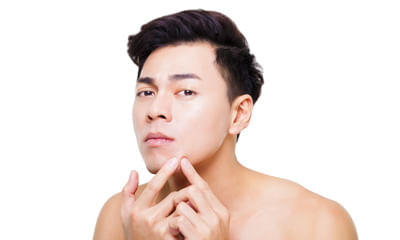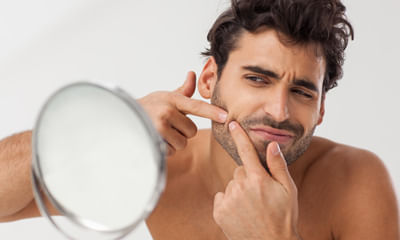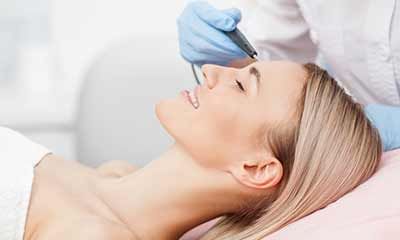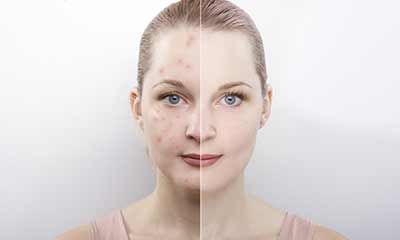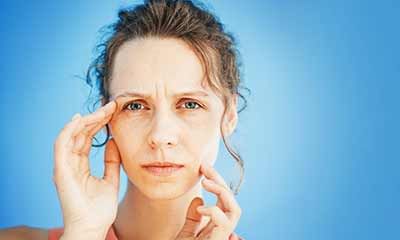Oral Steroid Side Effects
I am currently 25 years old, lately, I have been experiencing acne breakouts around my nose which I suspect is because o ...
Ask Free Question
Pimples, also known as acne, are primarily caused by a combination of factors involving the skin's oil glands, hair follicles, bacteria, and hormonal changes. Here are some of the common causes of pimples: 1. Excessive sebum production: sebum is an oily substance produced by the sebaceous glands in the skin. When the sebaceous glands produce too much sebum, it can clog the hair follicles, leading to the formation of pimples. 2. Clogged pores: the hair follicles or pores can become clogged with dead skin cells, dirt, and other debris. When this happens, it creates an environment where bacteria can thrive, causing inflammation and resulting in pimples. 3. Bacterial activity: the skin is home to bacteria, including propionibacterium acnes (p. Acnes). This bacterium feeds on the sebum produced by the skin and can multiply rapidly in clogged hair follicles, leading to inflammation and the formation of pimples. 4. Hormonal changes: hormonal fluctuations, particularly during puberty, menstruation, pregnancy, and menopause, can increase sebum production and alter the normal functioning of the skin. This hormonal imbalance can contribute to the development of pimples. 5. Diet: while the relationship between diet and acne is not fully understood, some studies suggest that certain foods, such as high-glycemic-index carbohydrates and dairy products, may worsen acne in susceptible individuals. However, more research is needed to establish definitive links. 6. Stress: stress can aggravate acne or contribute to its development. High-stress levels may increase inflammation in the body, leading to acne flare-ups. 7. Medications: some medications, such as corticosteroids, androgenic steroids, and certain anticonvulsants, may cause acne as a side effect. 8. Cosmetic products: certain makeup, skincare products, and hair styling products that are comedogenic (tend to clog pores) can contribute to the development of pimples. It's important to note that the causes and severity of acne can vary from person to person, and treating acne effectively often requires a tailored approach based on individual factors. If you're experiencing persistent or severe acne, it's advisable to consult a dermatologist for proper diagnosis and treatment.
I have oily skin so basically I have an oily face so due to acne and pimples I have open pores in my both cheeks and in ...
Ask Free Question
Pimples, also known as acne, are primarily caused by a combination of factors involving the skin's oil glands, hair follicles, bacteria, and hormonal changes. Here are some of the common causes of pimples: 1. Excessive sebum production: sebum is an oily substance produced by the sebaceous glands in the skin. When the sebaceous glands produce too much sebum, it can clog the hair follicles, leading to the formation of pimples. 2. Clogged pores: the hair follicles or pores can become clogged with dead skin cells, dirt, and other debris. When this happens, it creates an environment where bacteria can thrive, causing inflammation and resulting in pimples. 3. Bacterial activity: the skin is home to bacteria, including propionibacterium acnes (p. Acnes). This bacterium feeds on the sebum produced by the skin and can multiply rapidly in clogged hair follicles, leading to inflammation and the formation of pimples. 4. Hormonal changes: hormonal fluctuations, particularly during puberty, menstruation, pregnancy, and menopause, can increase sebum production and alter the normal functioning of the skin. This hormonal imbalance can contribute to the development of pimples. 5. Diet: while the relationship between diet and acne is not fully understood, some studies suggest that certain foods, such as high-glycemic-index carbohydrates and dairy products, may worsen acne in susceptible individuals. However, more research is needed to establish definitive links. 6. Stress: stress can aggravate acne or contribute to its development. High-stress levels may increase inflammation in the body, leading to acne flare-ups. 7. Medications: some medications, such as corticosteroids, androgenic steroids, and certain anticonvulsants, may cause acne as a side effect. 8. Cosmetic products: certain makeup, skincare products, and hair styling products that are comedogenic (tend to clog pores) can contribute to the development of pimples. It's important to note that the causes and severity of acne can vary from person to person, and treating acne effectively often requires a tailored approach based on individual factors. If you're experiencing persistent or severe acne, it's advisable to consult a dermatologist for proper diagnosis and treatment.
I am facing acne / pimple problem on my face from last month I have applied many neem face pack, facewash and many other ...
Ask Free Question
Acne is a skin condition that occurs when your hair follicles become plugged with oil and dead skin cells. It causes whiteheads, blackheads or pimples. These factors can trigger or aggravate acne: hormones, certain medications, diet, stress. To prevent pimples, eat fresh fruits, green vegetables, drinking plenty of water should be an essential part of your routine and intake of oily fried foods, an excess of sugar-salt should be avoided. Don't peal pimples, as they tend to leave scars. Stop using soap on face. Instead take a spoon of milk, add a pinch of turmeric (haldi). Mix n apply on face with the help of cotton. Leave for a few minutes then wash off. It’s a good cleanser. If skin is dry then apply moisturizer like coconut oil. For swollen pimples, gently apply ice for a minute or so. Just don't keep the ice on so long that it irritates your skin. Tea tree oil can kill bacteria. Some people use it to treat minor skin irritations, including acne. There isn't much research on how effective it is, but tea tree oil is safe to put directly on your skin in a diluted form. Try it on a small area first to make sure you don't have an allergic reaction. Simple honey mask--before applying this mask, rinse your face with warm water to open up pores. Then apply honey and leave it on the skin for 30 minutes. Rinse the honey off with warm water; then rinse again with cold water to close the pores. Yeast and yogurt mask for oily skin--oily skin is prone to acne, and this home remedy can reduce excess oil and help clear acne. To make the mask, combine 1 teaspoon of brewer's yeast with a little plain yogurt to create a thin mixture. Apply it thoroughly to all the oily areas and leave on for 15 to 20 minutes. Rinse with warm water; then use cold water to close the pores.Homeopathy is a very effective for this problem n has very encouraging results. Consult online for medicinal part.
I used betnovate c for almost a year now I stopped the usage of the cream for 20 days im facing skin pigmentation dry sk ...
Ask Free Question
Need to follow proper skin care routine. To start with sunscreen in morning and moisturizer in evening, cetaphil products are budget friendly and for pigmentation needs to be assessed before suggesting any medication, consult plastic surgeon for further details.
I'm 19 years old and had acne, blackheads, acne scars, an oily skin and recently I noticed some fine lines on my forehea ...
Ask Free Question
These are all photoaging signs, you need to add sunscreen in your routine and for other signs consult plastic surgeon for further diagnosis and treatment.
I saw one of your reply for which the question was: hi, I am having a ringworm in groin area, a doc suggested me to use ...
Ask Free Question
Hello. I went through your query. Keep the infected area clean and dry. Don't scratch the affected areas because this could spread the infection to other parts of your body ringworm usually disappear with allopathic creams but recurr after you stop using it. So I advise you to take homeopathic treatment which cure ringworm completely & permanently. No chance of recurrence. 100% cure. You can consult me online for homoeopathic treatment without side effects.
I saw one of your reply for which the question was: hi, I am having a ringworm in groin area, a doc suggested me to use ...
Ask Free Question
Dear lybrate-user, we should never apply cream containing steroids on fungal infection for following reasons: 1. It can flare up fungal infection because it reduces local immunity 2. It causes local side effects like skin thinning, stretch marks, white patch etc you should consult a dermatologist for proper treatment. Thanks & regards.
I went to a dermatologist for my back acne which I suffered from my teenage now I am 28 years old. That Dr. Recommended ...
Ask Free Question
Pimples, also known as acne, are primarily caused by a combination of factors involving the skin's oil glands, hair follicles, bacteria, and hormonal changes. Here are some of the common causes of pimples: 1. Excessive sebum production: sebum is an oily substance produced by the sebaceous glands in the skin. When the sebaceous glands produce too much sebum, it can clog the hair follicles, leading to the formation of pimples. 2. Clogged pores: the hair follicles or pores can become clogged with dead skin cells, dirt, and other debris. When this happens, it creates an environment where bacteria can thrive, causing inflammation and resulting in pimples. 3. Bacterial activity: the skin is home to bacteria, including propionibacterium acnes (p. Acnes). This bacterium feeds on the sebum produced by the skin and can multiply rapidly in clogged hair follicles, leading to inflammation and the formation of pimples. 4. Hormonal changes: hormonal fluctuations, particularly during puberty, menstruation, pregnancy, and menopause, can increase sebum production and alter the normal functioning of the skin. This hormonal imbalance can contribute to the development of pimples. 5. Diet: while the relationship between diet and acne is not fully understood, some studies suggest that certain foods, such as high-glycemic-index carbohydrates and dairy products, may worsen acne in susceptible individuals. However, more research is needed to establish definitive links. 6. Stress: stress can aggravate acne or contribute to its development. High-stress levels may increase inflammation in the body, leading to acne flare-ups. 7. Medications: some medications, such as corticosteroids, androgenic steroids, and certain anticonvulsants, may cause acne as a side effect. 8. Cosmetic products: certain makeup, skincare products, and hair styling products that are comedogenic (tend to clog pores) can contribute to the development of pimples. It's important to note that the causes and severity of acne can vary from person to person, and treating acne effectively often requires a tailored approach based on individual factors. If you're experiencing persistent or severe acne, it's advisable to consult a dermatologist for proper diagnosis and treatment.
I am using cosvate gm since 4 years. Whenever I stopped using it I got pimples all over my face. I am using it in my nec ...
Ask Free Question
Hi. Stop using this cream immediately. It is a steroid which can lead to many side effects. Apply cetaphil moisturising cream twice daily. If still there is problem consult a dermatologist.
I am 29 years old male. I was prescribed azelaic acid 20% and deriva bpo last year. I applied it for few months and left ...
Ask Free Question
Pimples, also known as acne, are primarily caused by a combination of factors involving the skin's oil glands, hair follicles, bacteria, and hormonal changes. Here are some of the common causes of pimples: 1. Excessive sebum production: sebum is an oily substance produced by the sebaceous glands in the skin. When the sebaceous glands produce too much sebum, it can clog the hair follicles, leading to the formation of pimples. 2. Clogged pores: the hair follicles or pores can become clogged with dead skin cells, dirt, and other debris. When this happens, it creates an environment where bacteria can thrive, causing inflammation and resulting in pimples. 3. Bacterial activity: the skin is home to bacteria, including propionibacterium acnes (p. Acnes). This bacterium feeds on the sebum produced by the skin and can multiply rapidly in clogged hair follicles, leading to inflammation and the formation of pimples. 4. Hormonal changes: hormonal fluctuations, particularly during puberty, menstruation, pregnancy, and menopause, can increase sebum production and alter the normal functioning of the skin. This hormonal imbalance can contribute to the development of pimples. 5. Diet: while the relationship between diet and acne is not fully understood, some studies suggest that certain foods, such as high-glycemic-index carbohydrates and dairy products, may worsen acne in susceptible individuals. However, more research is needed to establish definitive links. 6. Stress: stress can aggravate acne or contribute to its development. High-stress levels may increase inflammation in the body, leading to acne flare-ups. 7. Medications: some medications, such as corticosteroids, androgenic steroids, and certain anticonvulsants, may cause acne as a side effect. 8. Cosmetic products: certain makeup, skincare products, and hair styling products that are comedogenic (tend to clog pores) can contribute to the development of pimples. It's important to note that the causes and severity of acne can vary from person to person, and treating acne effectively often requires a tailored approach based on individual factors. If you're experiencing persistent or severe acne, it's advisable to consult a dermatologist for proper diagnosis and treatment.

